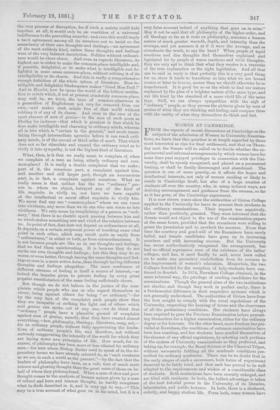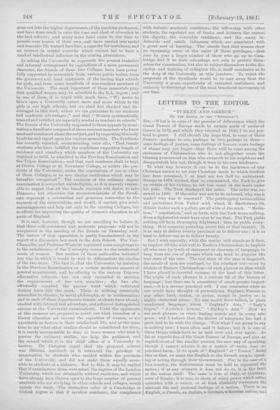WOMEN AT CAMBRIDGE.
pROM the reports of recent discussions at Cambridge on the subject of the admission of Women to University Examina-
tions, we learn that this question is at length regarded by those most interested as ripe for final settlement, and that on Thurs- day next the Senate will be called on to decide whether the ex- perimental and informal arrangements by which women have for some time past enjoyed privileges in connection with the Uni- versity, shall be openly recognised, and placed on a permanent footing, or shall be finally discouraged and abandoned. The question is one of some gravity, as it affects the hopes and intellectual interests, not only of women residing or likely to reside in Cambridge itself, but also of a large number of students all over the country, who, in many indirect ways, are deriving encouragement and guidance from the success, so far as it has gone, of the Cambridge experiment.
It is now eleven years since the authorities of Girton College applied to the University for leave to present their students to the ordinary examinations. Their request was negatively, rather than positively, granted. They were informed that the Senate would not object to the use of the examination-papers at the same hours, provided that the examiners wore willing to grant the permission and to overlook the answers. From that time the courtesy and good-will of the Examiners have rarely failed, and female candidates have gone up in increasing numbers and with increasing success. But the University has never authoritatively recognised the arrangement, has had no official cognisance even of the existence of the ladies' colleges, and has, it need liardly be said, never been called on to make any pecuniary contribution from its revenue to the improvement of WOMCII'S education. Meanwhile, the two Colleges founded for the reception of lady-students have con- tinued, to flourish. In 1874, Newnham College obtained, in the same informal way, the privilege of sending candidates for the examinations. Though the general aims of the two institutions are similar, and though they work in perfect amity, there is a fundamental difference in their respective systems which is not generally understood. The authorities of Girton have from the first sought to comply with the usual regulations of the University, respecting the keeping of terms and the observance of all the preliminary conditions. Her students have always been required to pass the Previous Examination before present- ing themselves for a higher examination, either for the ordinary degree or for honours. On the other hand, more freedom has pre- vailed at Newnham, the conditions of entrance examination have been loss exacting, and her students have availed themselves of the absence of any official regulations, by selecting such portions of the system of University examinations as they preferred, and taking up, for example, the Moral Science or the Classical Tripos, without necessarily fulfiling all the academic conditions pre- scribed for ordinary graduates. There can be no doubt that in the early stages of such a movement, both forms of experiment deserved to be fairly tried, and that each has proved to be well adapted to the requirements and wishes of a considerable class of students. Both institutions have been recently enlarged, and are filled with residents. In both, the fullest advantage is taken of the best tutorial power in the University, of its libraries, laboratories, and public lectures. In both, there is a sheltered, orderly, and happy student life. From both, some women have
gone out into the higher departments of the teaching profession, and have done much to raise the tone and ideal of education in the best schools; and many more have come in due time to preside over homes of their own, and have carried into social and domestic life trained faculties, a capacity for usefulness, and an interest in mental pursuits which cannot fail to have a marked intellectual influence on the coming generations.
In asking the University to supersede the present tentative and informal arrangement by regulations of a more permanent character, the friends of these two Colleges have been power- fully supported by memorials from various public bodies, from the governors and bead mistresses of the leading high schools for girls, and from some hundreds of non-resident members of the University. The most important of these memorials pray that qualified women may be admitted to the B.A. degree ; and in one of them, it is urged with much force, "We desire to throw open a University career more and more widely to the girls in our high schools, but we shall feel checked and dis- couraged in this work, unless we can guarantee to our students full academic advantages ;" and that ." Women systematically trained and certified are especially needed as teachers in schools." The Senate of the University responded to these appeals by nomi- nating a Syndicate composed of those resident members who knew most and eared most about the subject, and by requesting this body to advise and report upon the various memorials. The Syndicate has recently reported, recommending, inter alia, "That female students who have fulfilled the conditions respecting length of residence and standing which members of the University are required to fulfil, be admitted to the Previous Examination and the Tripos Examination; and that such residence shall be kept at Girton College or at Newnbam College, or within the pre- cincts of the University, under the regulations of one or other of these Colleges, or in any similar institution which may be hereafter recognised." The omission of the ordinary degree examination is somewhat unintelligible, as it is scarcely reason- able to expect that all the female students will desire to take Honours ; but otherwise the recommendations of the Syndi- cate represent a substantial and generous concession to the requests of the memorialists, and would, if carried, give much encouragement and help not only to the existing Colleges, but to efforts for improving the quality of women's education in all parts of England.
It is said, however, though we are unwilling to believe it, that these well-considered and moderate proposals will not be unopposed in the meeting of the Senate on Thursday next. The nature of that opposition is partly foreshadowed in the report of a discussion last week in the Arts School. The Vice- Chancellor and Professor Westcott expressed some misgivings as to the suitableness of the University course to the intellectual needs of women. But neither of those authorities indicated any way in which it would be well to differentiate the studies of the two sexes. The fact is, that the University, by insisting in the Previous Examination on a certain moderate amount of general acquirement, and by offering in the various Triposes alternative subjects, has not only succeeded in meeting the requirements of her own members ; she has also effectually supplied the precise want which cultivated women have felt the most. There is nothing essentially masculine in classics, in moral philosophy, or in mathematics ; and in each of these departments female students have already
studied with interest and advantage, and, achieved distinguished 131.1CUss at the University examinations. Until the opponents
of this measure are prepared to point out what branches of a liberal education are beyond the capacities of women, or are unsuitable as factors in their intellectual life, and at the same time to say what other studies should be substituted for them, it is surely unreasonable to deny to those women who wish to pursue the ordinary studies, the help, the guidance, and the reward which it is the chief office of a University to bestow. Dr. Campion urged that the proposed scheme was illiberal, inasmuch as it restricted the privilege of examination to students who resided within the precincts of the University, and did not make them equally acces- sible to etudeuts at a distance. But to this it may be replied that if examination alone were asked, the degrees of the London University, which are obtainable without residence, and which have already been thrown open to the large number of general students who are studying in other schools and colleges, would satisfy the want. The distinctive value of a Cambridge or Oxford degree is that it involves residence, the eompliance with definite academic conditions, the fellowship with other students, the regulated use of books and lectures, the repose, the dignity, the venerable traditions, and the many in- definable and subtle influences which are associated with a great seat of learning. The simple fact that women show an increasing sense of the value of these privileges,—that year by year a larger number of those who go up to Cam- bridge find it to their advantage not only to present them- selves for examination, but also to subject themselves to the dis- cipline and training of collegiate life, is itself conclusive as to the duty of the University at this juncture. To reject the proposals of the Syndicate would be to east away from the University a great opportunity of extended usefulness, and seriously to discourage one of the most beneficent movements of our time.



































 Previous page
Previous page